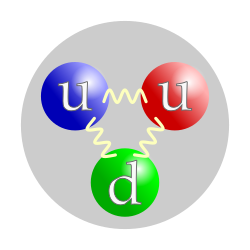Partikel

Partikel inggih punika obyek ingkang alit lan lokal ingkang saged dipunwastani kanthi sawetawis sipat fisik utawi kimia, kados ta jilid, kandhelan, utawi massa.[1][2] Partikel gadhah variasi ingkang ageng sanget wonten ing ukuran utawi cacahipun, wiwit saking partikel subatom kados ta elektron, dumugi partikel mikroskopik kados ta atom lan molekul, ngantos dhateng partikel makroskopik kados ta bubuk lan bahan granular sanesipun. Partikel ugi saged dipunagem kangge nyiptaaken model ilmiah saking obyek ingkang langkung ageng gumantung dhateng kandhelanipun, kados ta manungsa ingkang mlampah wonten ing kerumunan utawi awak langit ingkang mlampah. Sacara umum, tembung partikel gadhah teges ingkang ageng lan kaperang dados pirantos ingkang dipunbutuhaken déning sawetawis widang ilmu pengetahuan. Sasampunipun, bab punapa kemawon ingkang kagungan partikel saged dipunsebat minangka partikulat.[3]
Ing pamodelan alam, pamanggih babagan partikel punika migunani sanget, amargi panyinauan fenomena kanthi sakabehe bisa ugi rumit lan mbetahaken kalkulasi ingkang angel.[4] Pamanggih punika saged kangge nyederhanakaken asumsi bab proses-proses ingkang kalakon. Francis Sears lan Mark Zemansky, ing buku University Physics, maringi conto pengiraan papan dumunung lan kecepatan bal baseball ingkang dipuntangletaken ing hawa. Panjenenganipun kanthi bertahap mringkes bal baseball saking kalawau sipatipun, kanthi wiwitan ngidealken minangka bola lemes lan teges, banjur ngabaikan rotasi, gendul lan gesekan, ngantos pungkasane nyuda masalah dados balistik partikel titik klasik.[5] Panyinauan partikel ing cacah akeh punika minangka wilayah fisika statistika.[6]
-
Partikel asring dipunwakili minangka titik-titik. Gambar punika saged mewakili gerakan atom wonten ing gas, tiyang wonten ing kumpulan utawi lintang wonten ing langit wengi.
-
Para pandamel las busur kedah nglindungi piyambak saking percikan las.
Sitiran=
[besut | besut sumber]- ↑ "Particle". AMS Glossary. American Meteorological Society. Dibukak ing 2015-04-12.
- ↑ "Particle". Oxford English Dictionary (édhisi ka-3rd). Oxford University Press. September 2005.
- ↑ T. W. Lambe; R. V. Whitman (1969). Soil Mechanics. John Wiley & Sons. kc. 18. ISBN 978-0-471-51192-2.
The word 'particulate' means 'of or pertaining to a system of particles'.
- ↑ F. W. Sears; M. W. Zemansky (1964). "Equilibrium of a Particle". University Physics (édhisi ka-3rd). Addison-Wesley. kc. 26–27. LCCN 63015265.
- ↑ F. W. Sears; M. W. Zemansky (1964). "Equilibrium of a Particle". University Physics (édhisi ka-3rd). Addison-Wesley. kc. 27. LCCN 63015265.
A body whose rotation is ignored as irrelevant is called a particle. A particle may be so small that it is an approximation to a point, or it may be of any size, provided that the action lines of all the forces acting on it intersect in one point.
- ↑ F. Reif (1965). "Statistical Description of Systems of Particles". Fundamentals of Statistical and Thermal Physics. McGraw-Hill. kc. 47ff. ISBN 978-0-07-051800-1.
Text is available under the CC BY-SA 4.0 license; additional terms may apply.
Images, videos and audio are available under their respective licenses.



